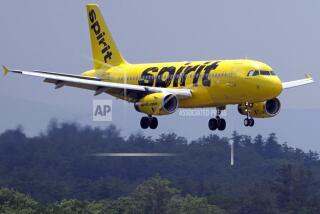TWA Is Seeking to Repurchase Most of Its Debt
- Share via
NEW YORK — Trans World Airlines on Wednesday launched a tender offer to buy back most of its debt in an effort to restructure without filing for bankruptcy court protection.
The struggling carrier said it is offering debt holders cash payments ranging from 17.5 cents for each dollar of debt to 73 cents on the dollar.
Separately, TWA also said it lost $88.2 million in the first quarter, despite a one-time gain of $110.0 million from selling a Chicago-to-London route to American Airlines. The loss came on revenue of $820.1 million. It compared to a loss of $143 million on revenue of $1.01 billion in the same period last year.
In urging debt holders to accept the tender offer, TWA Chairman Carl C. Icahn warned in a statement that the offer may exceed the amount that holders of debt securities might receive if the airline is forced into bankruptcy. He also said there is no assurance that TWA “would be able to survive” a bankruptcy “or that its assets would not have to be sold for liquidation in a market currently saturated with available airline assets.”
To avoid bankruptcy, TWA said, it must also make peace with its unions and resolve lawsuits relating to its failure to make lease payments due on its fleet of aircraft. A New York judge recently ruled that a Connecticut bank could seize 10 planes and several engines on which the carrier is delinquent in payments.
TWA defaulted on $75.5 million worth of debt in February in order to preserve cash.
Even if all the debt is tendered, the airline said it will “still conduct its operations at a significant loss” unless it can successfully negotiate union concessions and agreements that unions will not engage in work stoppages. It said it has “tenuous” relations with its three major unions, which represent pilots, machinists and flight attendants.
Reaching an agreement with the machinists will be “extremely difficult,” TWA said, adding that it will attempt to facilitate an agreement by offering equity in exchange for concessions.
The airline blamed “severe overcapacity, unmanageable cost escalations and pernicious price wars” for its perilous financial situation. It warned that such problems and others “may virtually exhaust its cash reserves by mid-1992 unless the tender offer and other restructuring steps are successful in materially reducing the outstanding amount of debt securities (and) related debt service requirements.”
According to filings with the Securities & Exchange Commission, TWA had $2.6 billion in debt at the end of 1990 and had made $303 million in interest payments on outstanding obligations.
The carrier, 90% of which is owned by Icahn, said suspension of payments on its debt would continue during and after the tender offer.
If the tender offer succeeds, analysts said, it would help the carrier significantly.
“It means that one major cost element--the interest payments--of the airline no longer exists,” said Hans J. Plickert, a principal in Transportation Group, an affiliate of Paine Webber. “That could make it easier for the airline to survive or for it to become a merger partner. Debt turns people (potential acquirers) off.”
Scott Hamilton, editor of Dallas-based Commercial Aviation Report, said the tender offer was not unexpected. But, he added, “the question now is will the certificate holders be willing to take so little on the dollar now in hopes that they can come out better than in a bankruptcy?”
Hamilton added that since 1985, “Icahn has used other people’s money to do with TWA what he wanted and now he is offering to buy back the debt for pennies on the dollar. If he is successful, he has fundamentally had a free loan over these years. That’s not bad if you can get away with it.”
The debt holders of TWA, analysts said, are all large institutional investors.
G. E. Bloomer, managing director of Credit Research and Trading Corp.--a Greenwich, Conn.-based financial adviser to some of the debt holders--said of the tender offer: “It is a good start, but it is only a start, and the bond holders need to conduct their own review of the offer and the airline operations to determine if this is the best possible offer.”
Kent Scott, chairman of the pilots union, said he was unhappy with the bid. “We are surprised at the amount of the bid. . . . It is higher than we had been led to believe. We had hoped he would have left some more money in the airline.”
More to Read
Inside the business of entertainment
The Wide Shot brings you news, analysis and insights on everything from streaming wars to production — and what it all means for the future.
You may occasionally receive promotional content from the Los Angeles Times.










